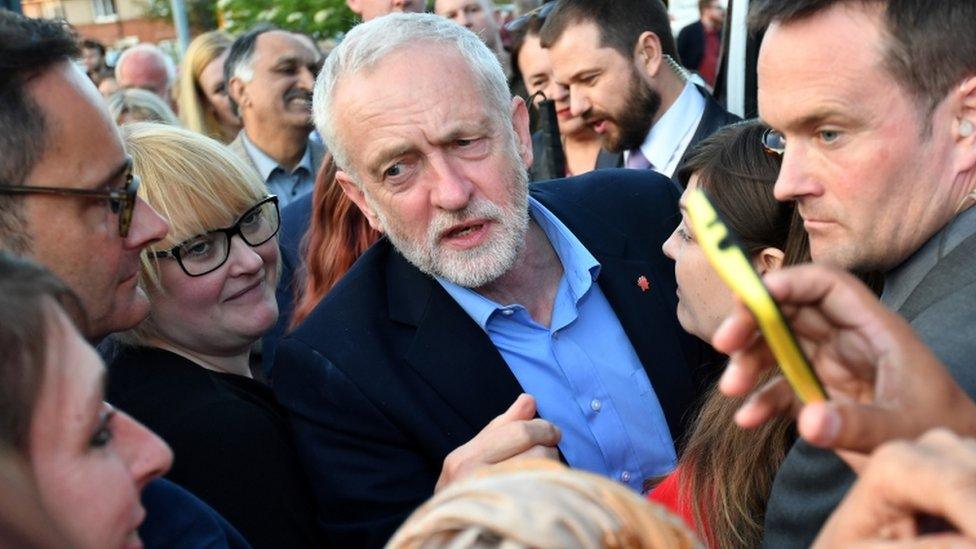Labour manifesto leak proves there is bad publicity
- Published

Jeremy Corbyn might be hoping that there's no such thing as bad publicity
Perhaps Jeremy Corbyn might take comfort from the wise words of Scotland's National Bard, as regularly disseminated by Alex Salmond, he who formerly led the SNP.
Quoting Robert Burns, Mr Salmond is wont to say: "The mair they talk, I'm kent the better." *
By which Mr Salmond implies - and presumably the bold Rabbie implied - that popular attention is welcome, even if the original cause might be tricky.
It is an 18th Century version, if you like, of the more contemporaneous saying that there is no such thing as bad publicity.
That modern version is a fine statement. It is a bold statement. It is a courageous statement. Just one snag. It is piffle. Bilge from beginning to end.
Of course, there is such a thing as bad publicity. When the FBI director (that's the departed one) announced that he was resuming inquiries into Hillary Clinton's emails, did she punch the air and declare: "Yippee, there's no such thing as bad publicity"?
Well, I wasn't there when the news was broken to her, so perhaps she did. But I'm willing to wager that she did not. (Actually, I'm not because I regard gambling as arithmetically daft but you get the concept.
Labour campaigns chief: At least people are talking about our policies
Back, however, to Mr Corbyn. How does he respond to the leak of his party's manifesto for the UK general election?
The only available option is chutzpah. And that, presumably, is the path he will eventually pursue. His first response, understandably, was to withdraw from a scheduled engagement in order to address the internal controversy.
Internal political leaks generally have three potential purposes.
One, the leadership is flying a kite to see whether a particular policy will run. If the reaction is wholly negative, they can then quietly dump the plan, denying that it was official policy at any point.
Two, a faction or an individual within a party or government may be seeking to advance a particular agenda of their own. Seeking, perhaps, to pre-empt another avenue which is attracting the attention of the leadership.
Three, the leak may be designed to trouble and destabilise the leadership itself. To cause bother. To provoke uncertainty.
I think we may discount option one: a manifesto is scarcely a fit topic for kite-flying. Too serious, too comprehensive. Option two may also be ruled out for the same reason. This is not an early draft: it is close to the final publication.
Which leaves option three. That this leak was motivated by malice, internally. That it was designed to make trouble for the leadership. Given the pre-existing state of the Labour Party, that is an all too credible presumption.

Kezia Dugdale said she had "worked very closely" with Labour's UK-wide team to create the manifesto
The impact for Scotland? The Scottish Labour Party will, of course, publish their own version, tailored to devolved reality. But it is the UK version, external which will prevail in issues like business taxation, Brexit negotiations, the broad economy, renationalisation - and Trident, where the leaked manifesto supports renewal, contrary to the views of Mr Corbyn and the Scottish Labour conference.
There has been input from Labour in Scotland to the process - and there has been more in the run-up to today's London meeting to consider the manifesto process.
I understand that Scottish Labour would like the manifesto to state more firmly that the Barnett funding formula would be retained. They would also welcome clarity on the point that some social security powers are devolved (the manifesto is long on defending benefits). And they want further overt support for the North Sea oil and gas industry.
Trident? Kezia Dugdale told me that the Scottish party argued for one option within the democratic procedures of the Labour Party.
Was Scotland overruled, I asked? No, said Ms Dugdale, open and fair procedure was followed.
Rival parties have, not surprisingly, pounced. The SNP said the Trident verdict showed the relative irrelevance of the Scottish party. The Tories seized upon the renationalisation plans as a step back into the past. And the Liberal Democrats - like others - said the leak showed "chaos" within Labour.
Ms Dugdale's view on developments? The leak, she said placidly, was "far from ideal".
*Glossary: Mair = more. Kent = known.
This is provided as a service for those whose knowledge of Scots has waned or never rose in the first place.
- Published11 May 2017
